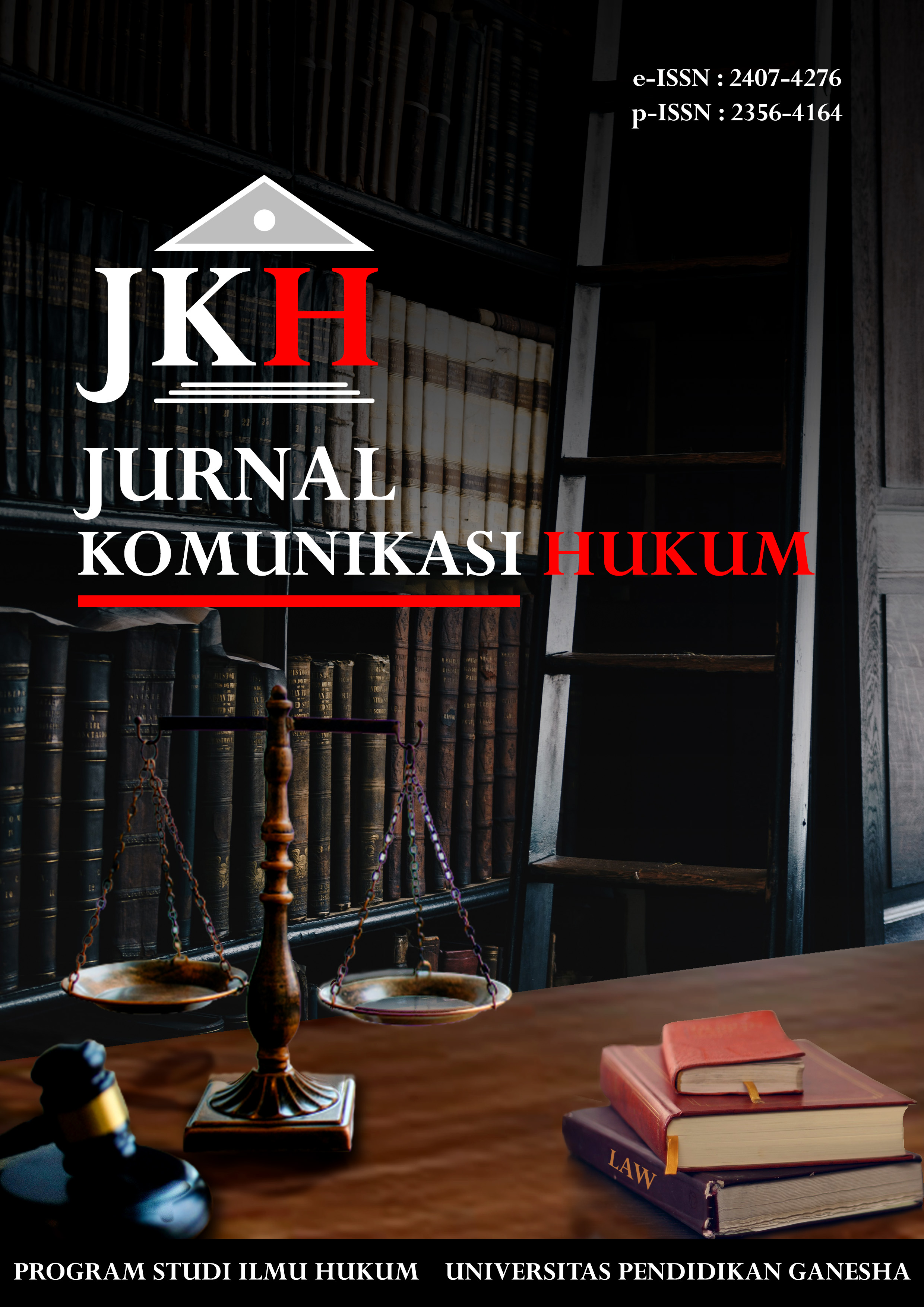Efektifitas Penerapan Sanksi Administrasi Terhadap Warga Negara Asing Yang Melakukan Pelanggaran Visa Di Bali
DOI:
https://doi.org/10.23887/jkh.v7i2.38837Abstract
The problem of international migration at this time has become a problem for every country, be it country of origin, country of destination or country of transit. Several government policies related to granting visas to foreign nationals are expected to encourage the number of foreign arrivals to Indonesia. However, the existence of these policies has resulted in an increase in the number of immigration violations in Indonesia. The main problems in research on Immigration administrative sanctions against foreigners in Indonesia in terms of Law Number 6 of 2011 concerning Immigration are: How effective is the implementation of administrative sanctions against visa violators by foreign nationals and How are the efforts of immigration officers in preventing visa violations by foreign nationals? foreign nationals in Bali. The research method that the author uses is an empirical type with the aim of the studybeing to see the effectiveness of administrative sanctions against foreign nationals who violate visas in Bali. The theories used are Legal Certainty Theory, Legal Effectiveness Theory, Law Enforcement Theory, Authority Theory, Justice Theory and Benefit Theory. The results of the study indicate that application administrative sanctions for violations of visas inthe Bali Region have not been effective, it can be seen from the data obtained in the field during the last five years there are still many foreign nationals who have been caught in violation casesand during the last five years the number of cases violations in Bali continue to increase. This shows that administrative sanctions do not provide a deterrent effect for perpetrators and other foreigners. Therefore, the immigration authorities should be firm in bringing cases of violations and misuse of visas to court. Immigration officers' efforts to prevent visa violations in Bali are in the form of preventive and repressive measures, the Immigration Office in Bali coordinates withrelevant agencies or agencies, receives reports and follows up on any reports, takes action against foreign nationals who violate. Obstacles faced by the Immigration Office in preventing the abuse of visa-free visits for foreigners in Bali are internal factors including limited human resources, limited operational budget for immigration control, low expertise of immigration officers in supervising foreigners, and external factors, namely the role of the community that has not been supportive immigration officers in providing correct information regarding the presence and activities of foreign nationals.
Downloads
Published
How to Cite
Issue
Section
License
Authors who publish with this journal agree to the following terms:- Authors retain copyright and grant the journal right of first publication with the work simultaneously licensed under a Creative Commons Attribution License that allows others to share the work with an acknowledgement of the work's authorship and initial publication in this journal.
- Authors are able to enter into separate, additional contractual arrangements for the non-exclusive distribution of the journal's published version of the work (e.g., post it to an institutional repository or publish it in a book), with an acknowledgement of its initial publication in this journal.
- Authors are permitted and encouraged to post their work online (e.g., in institutional repositories or on their website) prior to and during the submission process, as it can lead to productive exchanges, as well as earlier and greater citation of published work (See The Effect of Open Access).
Authors who publish with this journal agree to the following terms:
- Authors retain copyright and grant the journal right of first publication, with the work [SPECIFY PERIOD OF TIME] after publication simultaneously licensed under aCreative Commons Attribution License that allows others to share the work with an acknowledgement of the work's authorship and initial publication in this journal.
- Authors are able to enter into separate, additional contractual arrangements for the non-exclusive distribution of the journal's published version of the work (e.g., post it to an institutional repository or publish it in a book), with an acknowledgement of its initial publication in this journal.
- Authors are permitted and encouraged to post their work online (e.g., in institutional repositories or on their website) prior to and during the submission process, as it can lead to productive exchanges, as well as earlier and greater citation of published work (See The Effect of Open Access).












